Brico Devices CSR: Analysis, Recommendations for Improvement
VerifiedAdded on 2023/06/13
|5
|851
|138
Report
AI Summary
This report analyzes Brico Devices' Corporate Social Responsibility (CSR) practices, highlighting issues such as poor working conditions, low pay rates, unsustainable practices, and unsafe waste disposal. The analysis reveals that the company's lack of a robust CSR policy has led to negative publicity and reputational damage. The report emphasizes the importance of CSR for businesses, particularly in enhancing company reputation and long-term shareholder value. It concludes with recommendations for Brico Devices to improve its CSR strategy, focusing on improving working conditions, adopting sustainable practices, and ensuring responsible waste disposal, all of which can contribute to a better public image and increased employee motivation. Desklib provides access to similar reports and solved assignments for students.
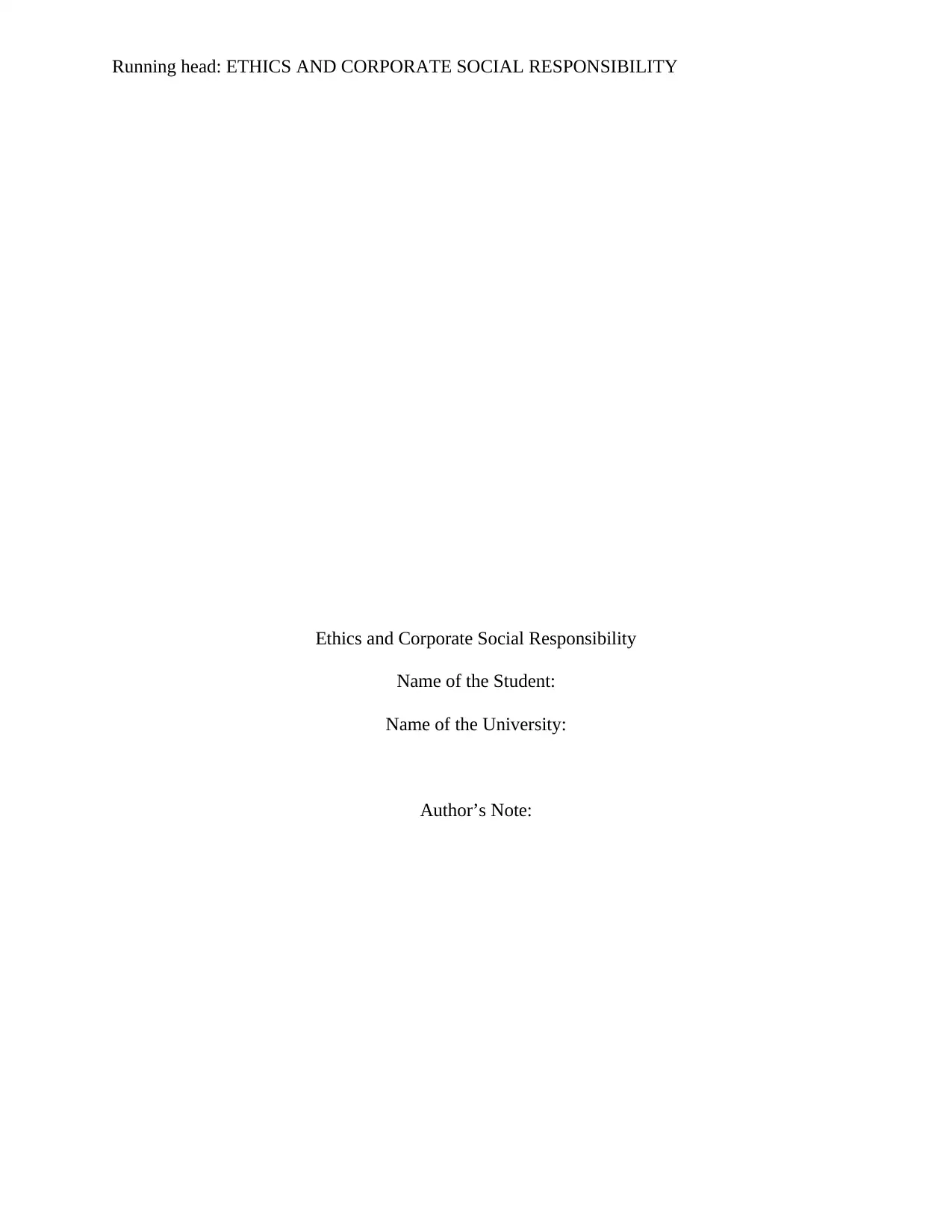
Running head: ETHICS AND CORPORATE SOCIAL RESPONSIBILITY
Ethics and Corporate Social Responsibility
Name of the Student:
Name of the University:
Author’s Note:
Ethics and Corporate Social Responsibility
Name of the Student:
Name of the University:
Author’s Note:
Paraphrase This Document
Need a fresh take? Get an instant paraphrase of this document with our AI Paraphraser
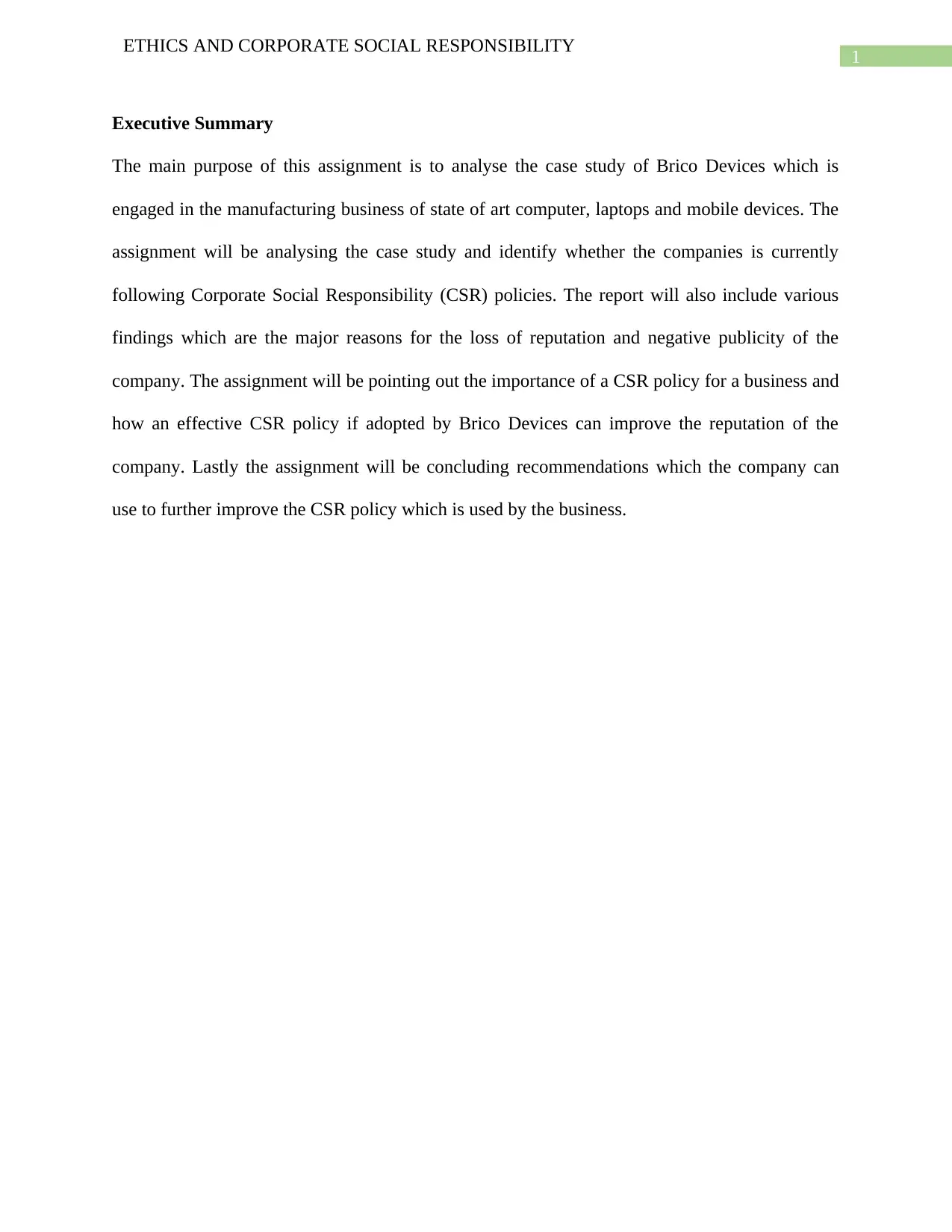
1
ETHICS AND CORPORATE SOCIAL RESPONSIBILITY
Executive Summary
The main purpose of this assignment is to analyse the case study of Brico Devices which is
engaged in the manufacturing business of state of art computer, laptops and mobile devices. The
assignment will be analysing the case study and identify whether the companies is currently
following Corporate Social Responsibility (CSR) policies. The report will also include various
findings which are the major reasons for the loss of reputation and negative publicity of the
company. The assignment will be pointing out the importance of a CSR policy for a business and
how an effective CSR policy if adopted by Brico Devices can improve the reputation of the
company. Lastly the assignment will be concluding recommendations which the company can
use to further improve the CSR policy which is used by the business.
ETHICS AND CORPORATE SOCIAL RESPONSIBILITY
Executive Summary
The main purpose of this assignment is to analyse the case study of Brico Devices which is
engaged in the manufacturing business of state of art computer, laptops and mobile devices. The
assignment will be analysing the case study and identify whether the companies is currently
following Corporate Social Responsibility (CSR) policies. The report will also include various
findings which are the major reasons for the loss of reputation and negative publicity of the
company. The assignment will be pointing out the importance of a CSR policy for a business and
how an effective CSR policy if adopted by Brico Devices can improve the reputation of the
company. Lastly the assignment will be concluding recommendations which the company can
use to further improve the CSR policy which is used by the business.
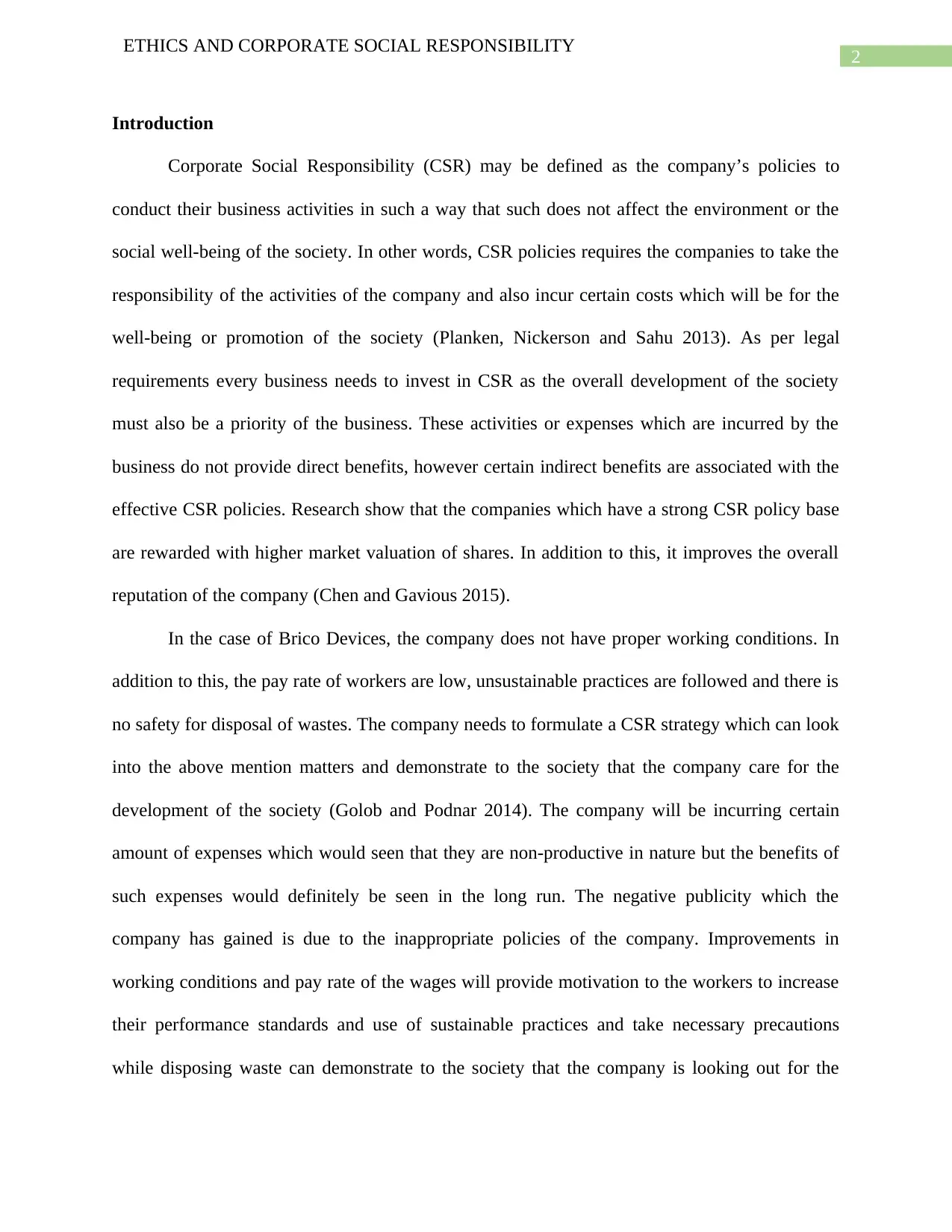
2
ETHICS AND CORPORATE SOCIAL RESPONSIBILITY
Introduction
Corporate Social Responsibility (CSR) may be defined as the company’s policies to
conduct their business activities in such a way that such does not affect the environment or the
social well-being of the society. In other words, CSR policies requires the companies to take the
responsibility of the activities of the company and also incur certain costs which will be for the
well-being or promotion of the society (Planken, Nickerson and Sahu 2013). As per legal
requirements every business needs to invest in CSR as the overall development of the society
must also be a priority of the business. These activities or expenses which are incurred by the
business do not provide direct benefits, however certain indirect benefits are associated with the
effective CSR policies. Research show that the companies which have a strong CSR policy base
are rewarded with higher market valuation of shares. In addition to this, it improves the overall
reputation of the company (Chen and Gavious 2015).
In the case of Brico Devices, the company does not have proper working conditions. In
addition to this, the pay rate of workers are low, unsustainable practices are followed and there is
no safety for disposal of wastes. The company needs to formulate a CSR strategy which can look
into the above mention matters and demonstrate to the society that the company care for the
development of the society (Golob and Podnar 2014). The company will be incurring certain
amount of expenses which would seen that they are non-productive in nature but the benefits of
such expenses would definitely be seen in the long run. The negative publicity which the
company has gained is due to the inappropriate policies of the company. Improvements in
working conditions and pay rate of the wages will provide motivation to the workers to increase
their performance standards and use of sustainable practices and take necessary precautions
while disposing waste can demonstrate to the society that the company is looking out for the
ETHICS AND CORPORATE SOCIAL RESPONSIBILITY
Introduction
Corporate Social Responsibility (CSR) may be defined as the company’s policies to
conduct their business activities in such a way that such does not affect the environment or the
social well-being of the society. In other words, CSR policies requires the companies to take the
responsibility of the activities of the company and also incur certain costs which will be for the
well-being or promotion of the society (Planken, Nickerson and Sahu 2013). As per legal
requirements every business needs to invest in CSR as the overall development of the society
must also be a priority of the business. These activities or expenses which are incurred by the
business do not provide direct benefits, however certain indirect benefits are associated with the
effective CSR policies. Research show that the companies which have a strong CSR policy base
are rewarded with higher market valuation of shares. In addition to this, it improves the overall
reputation of the company (Chen and Gavious 2015).
In the case of Brico Devices, the company does not have proper working conditions. In
addition to this, the pay rate of workers are low, unsustainable practices are followed and there is
no safety for disposal of wastes. The company needs to formulate a CSR strategy which can look
into the above mention matters and demonstrate to the society that the company care for the
development of the society (Golob and Podnar 2014). The company will be incurring certain
amount of expenses which would seen that they are non-productive in nature but the benefits of
such expenses would definitely be seen in the long run. The negative publicity which the
company has gained is due to the inappropriate policies of the company. Improvements in
working conditions and pay rate of the wages will provide motivation to the workers to increase
their performance standards and use of sustainable practices and take necessary precautions
while disposing waste can demonstrate to the society that the company is looking out for the
⊘ This is a preview!⊘
Do you want full access?
Subscribe today to unlock all pages.

Trusted by 1+ million students worldwide
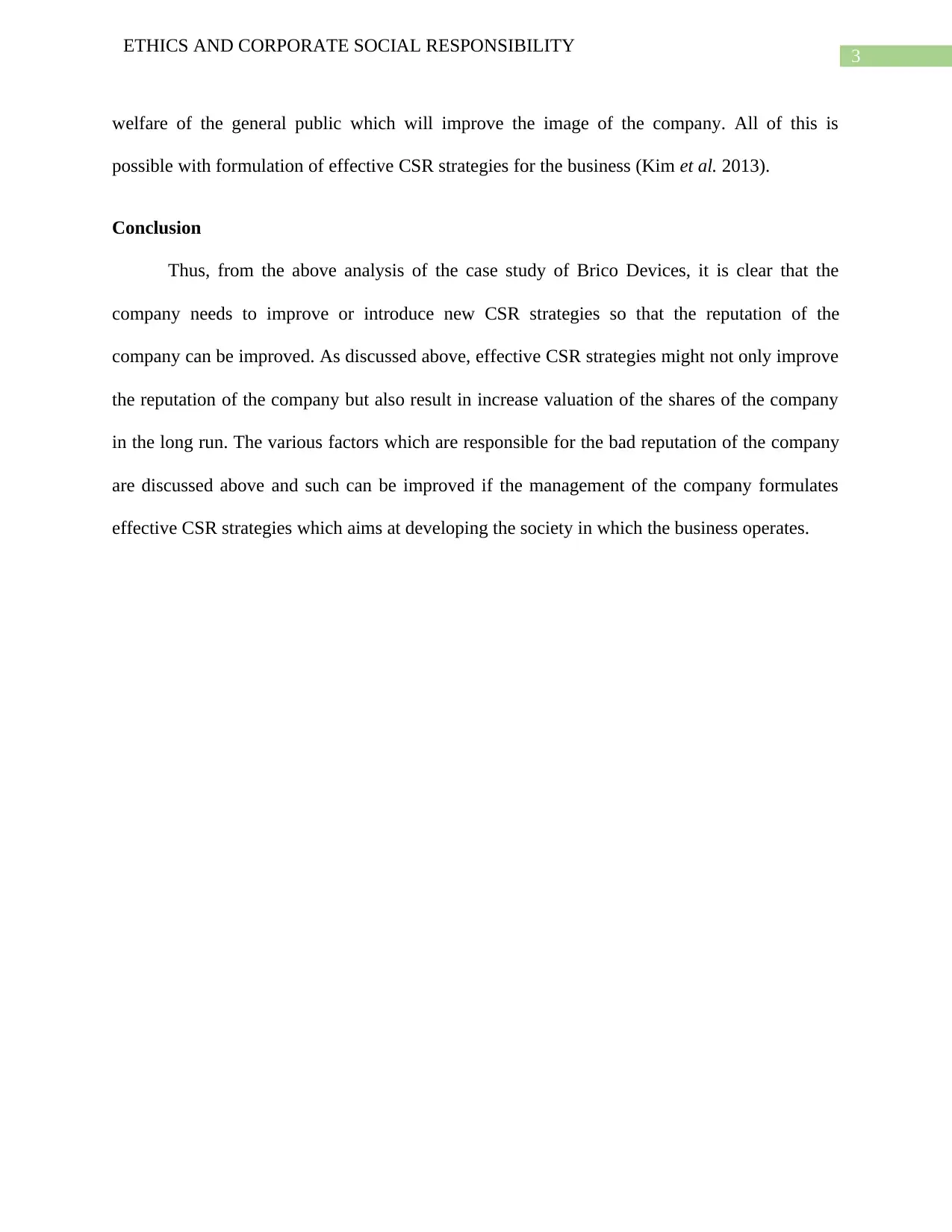
3
ETHICS AND CORPORATE SOCIAL RESPONSIBILITY
welfare of the general public which will improve the image of the company. All of this is
possible with formulation of effective CSR strategies for the business (Kim et al. 2013).
Conclusion
Thus, from the above analysis of the case study of Brico Devices, it is clear that the
company needs to improve or introduce new CSR strategies so that the reputation of the
company can be improved. As discussed above, effective CSR strategies might not only improve
the reputation of the company but also result in increase valuation of the shares of the company
in the long run. The various factors which are responsible for the bad reputation of the company
are discussed above and such can be improved if the management of the company formulates
effective CSR strategies which aims at developing the society in which the business operates.
ETHICS AND CORPORATE SOCIAL RESPONSIBILITY
welfare of the general public which will improve the image of the company. All of this is
possible with formulation of effective CSR strategies for the business (Kim et al. 2013).
Conclusion
Thus, from the above analysis of the case study of Brico Devices, it is clear that the
company needs to improve or introduce new CSR strategies so that the reputation of the
company can be improved. As discussed above, effective CSR strategies might not only improve
the reputation of the company but also result in increase valuation of the shares of the company
in the long run. The various factors which are responsible for the bad reputation of the company
are discussed above and such can be improved if the management of the company formulates
effective CSR strategies which aims at developing the society in which the business operates.
Paraphrase This Document
Need a fresh take? Get an instant paraphrase of this document with our AI Paraphraser
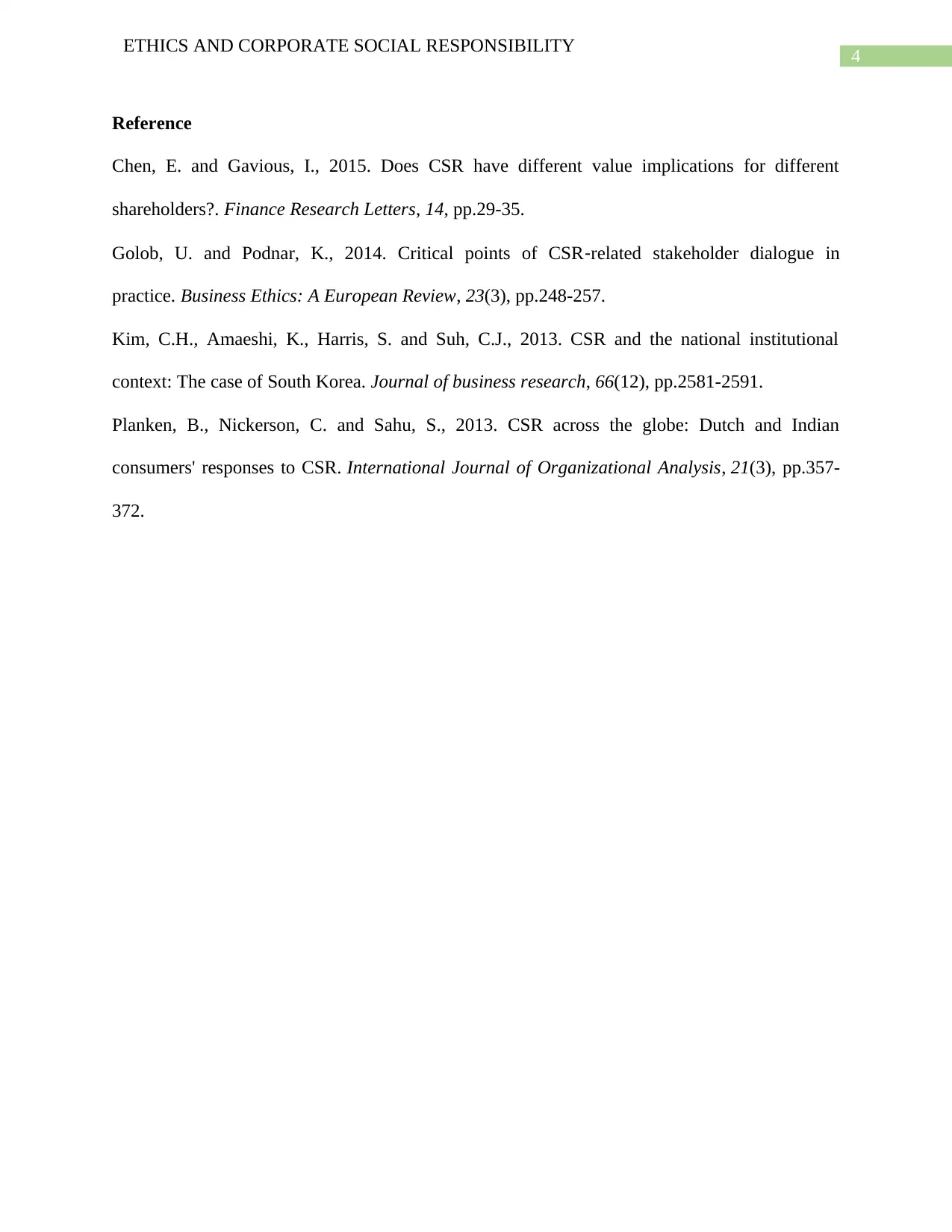
4
ETHICS AND CORPORATE SOCIAL RESPONSIBILITY
Reference
Chen, E. and Gavious, I., 2015. Does CSR have different value implications for different
shareholders?. Finance Research Letters, 14, pp.29-35.
Golob, U. and Podnar, K., 2014. Critical points of CSR‐related stakeholder dialogue in
practice. Business Ethics: A European Review, 23(3), pp.248-257.
Kim, C.H., Amaeshi, K., Harris, S. and Suh, C.J., 2013. CSR and the national institutional
context: The case of South Korea. Journal of business research, 66(12), pp.2581-2591.
Planken, B., Nickerson, C. and Sahu, S., 2013. CSR across the globe: Dutch and Indian
consumers' responses to CSR. International Journal of Organizational Analysis, 21(3), pp.357-
372.
ETHICS AND CORPORATE SOCIAL RESPONSIBILITY
Reference
Chen, E. and Gavious, I., 2015. Does CSR have different value implications for different
shareholders?. Finance Research Letters, 14, pp.29-35.
Golob, U. and Podnar, K., 2014. Critical points of CSR‐related stakeholder dialogue in
practice. Business Ethics: A European Review, 23(3), pp.248-257.
Kim, C.H., Amaeshi, K., Harris, S. and Suh, C.J., 2013. CSR and the national institutional
context: The case of South Korea. Journal of business research, 66(12), pp.2581-2591.
Planken, B., Nickerson, C. and Sahu, S., 2013. CSR across the globe: Dutch and Indian
consumers' responses to CSR. International Journal of Organizational Analysis, 21(3), pp.357-
372.
1 out of 5
Related Documents
Your All-in-One AI-Powered Toolkit for Academic Success.
+13062052269
info@desklib.com
Available 24*7 on WhatsApp / Email
![[object Object]](/_next/static/media/star-bottom.7253800d.svg)
Unlock your academic potential
Copyright © 2020–2026 A2Z Services. All Rights Reserved. Developed and managed by ZUCOL.





